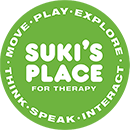Parent Guide
How do I know if my infant/toddler needs therapy?
If your child is experiencing some of the following problems, he or she may be eligible for therapy:
• Easily startled
• Unable to bring hands together
• Doesn’t explore
• Dislikes baths
• Resists being held, dislikes being cuddled, tense when held
• Overly active; constantly moving
• Sleep difficulties; unable to settle down
• Slow to roll over, creep, sit or stand
• Sucking difficulties
• Difficulty consoling self
• Cries or becomes tense when moved through space
• Frequent fisting of hands after six months
• Poor muscle tone
How do I know if my pre-school-age (3 to 5 years) child needs therapy?
If your child is experiencing some of the following problems, he or she may be eligible for therapy:
• Low muscle tone; appears weak or floppy
• Clumsy, falls frequently
• Breaks toys or crayons easily
• Dislikes coloring in lines, doing puzzles, or cutting with scissors
• Delayed language development
• Does not enjoy jumping, swings, or having feet off the ground
• Avoids playground activities
• Over-reacts to touch, sounds, taste, or odors
• Difficulty focusing attention
• Says “I can’t” or “I won’t” to age-appropriate self-care or play
• Bumps into furniture or people; has trouble judging body in relation to space around him/her
How do I know if my school age child needs therapy?
If your child is experiencing some of the following problems, he or she may be eligible for therapy:
• Reverses letters such as b and d, can’t space letters on the line
• Difficulty paying attention or following directions; over-focused and unable to shift to the next task
• Overly active, unable to slow down
• Poor self-esteem, lack of confidence
• Dislikes handwriting, tires quickly during written class work
• Avoids physical education or sports activities
• Dislikes swimming, bathing, hugs, and/or hair cuts
• Over-reacts to touch, taste, sounds, or odors
• Difficulty playing with age-appropriate toys
• Difficulty making friends with children of same age (prefers to play with adults or younger children)
• Difficulty following several step instructions for motor tasks

